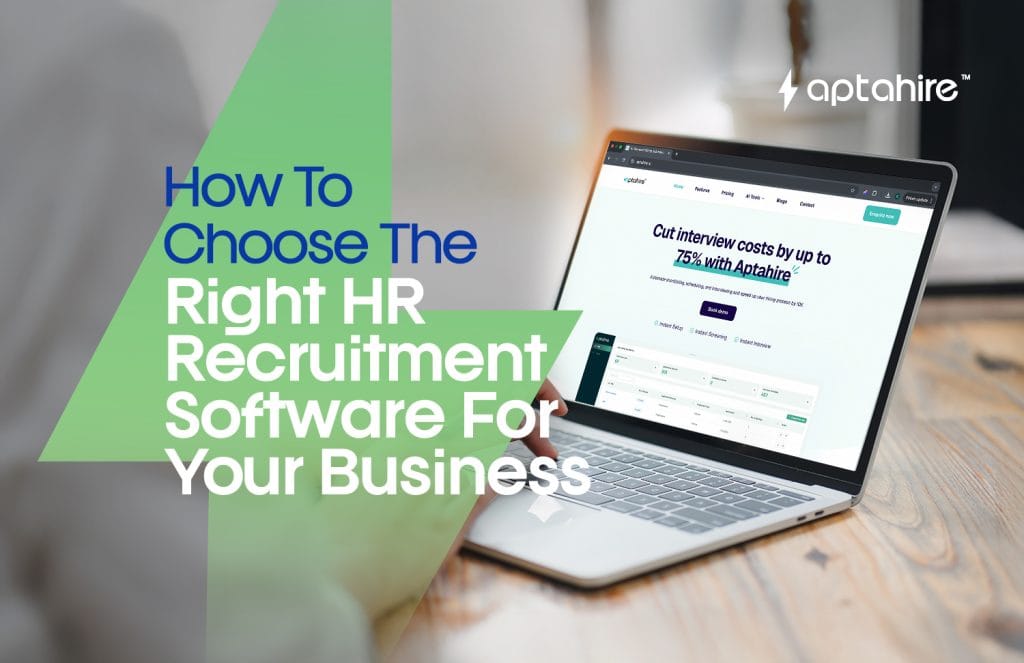How to Pick the Perfect HR Recruitment Software for Your Business

Hiring the right people is the backbone of any successful business.
Recruitment can be a time-consuming, overwhelming process. That’s where HR recruitment software comes in! The right tool can simplify your hiring process, save you time, and help you attract top talent. But with so many options out there, how do you know which one to choose? Let’s break it down.
1. Figure Out What You Need
Before jumping into the sea of software choices, take a moment to assess your needs. Ask yourself:
- Are you struggling to track applications and resumes?
- Do you need AI to help screen candidates?
- Should the software integrate with your existing HR tools?
- What’s your budget?
Knowing what you need will help you avoid wasting time (and money) on software that doesn’t fit your business.
2. Must-Have Features to Look For
The best HR recruitment software should make your life easier. Here are some key features to consider:
- Applicant Tracking System (ATS): Keeps all candidate info in one place.
- Resume Parsing: Extracts important details from resumes automatically.
- Job Posting Automation: Posts your job openings on multiple platforms with one click.
- AI-Powered Screening: Helps filter the best candidates faster.
- Interview Scheduling: Syncs with calendars for easy scheduling.
- Collaboration Tools: Lets your HR team and hiring managers work together seamlessly.
- Analytics & Reporting: Provides insights to improve your hiring process.
3. Make Sure It’s User-Friendly
No one wants to struggle with complicated software! Look for:
- An intuitive dashboard: Easy to navigate without endless training.
- Mobile access: So you and your candidates can use it on the go.
- Customizable workflows: Adaptable to your unique hiring process.
4. Check for Easy Integration
If you’re already using HR tools for payroll, onboarding, or performance tracking, your new recruitment software should integrate smoothly. The last thing you need is a system that creates more work instead of streamlining it!
5. Think About Growth
Your business will evolve, and so will your hiring needs. Choose software that can grow with you and offers flexible pricing options as your team expands.
6. Security Matters
Recruitment software stores sensitive candidate data, so make sure it complies with data protection regulations like GDPR and has strong security measures in place.
7. Read Reviews & Test Customer Support
Good customer support is a lifesaver. Before committing, check for:
- 24/7 customer support (or at least quick response times)
- Dedicated account managers
- Training resources to help your team get up to speed
Reading reviews from other businesses can also give you an idea of how reliable the software is.
8. Try Before You Buy
Many providers offer free trials or demos—use them! Test the software’s functionality and see if it works for your team before making a final decision.
Why Aptahire is the Right Choice
Aptahire is designed to take the guesswork out of hiring by leveraging advanced algorithms to match you with the perfect candidates. Its AI-powered screening process ensures that only the most qualified applicants make it to your shortlist, saving you time and effort. With an intuitive interface, seamless integration with existing HR tools, and data-driven insights, Aptahire makes recruitment smarter, faster, and more efficient. Whether you’re hiring for a small business or a large enterprise, Aptahire ensures you find the right talent with precision and ease.
Final Thoughts
Picking the right HR recruitment software doesn’t have to be stressful. Focus on your needs, look for essential features, check for seamless integration, and take advantage of free trials. The right software will save you time, help you attract the best candidates, and make your hiring process smoother than ever. Happy recruiting!
FAQs
- What is the best software for a recruitment agency?
The best recruitment software depends on the agency’s needs, but some top choices include:
- Bullhorn – Great for large agencies with CRM and ATS capabilities.
- Workable – Best for small to mid-sized agencies with AI-powered sourcing.
- Recruiterflow – A user-friendly option with automation and CRM features.
- Greenhouse – Ideal for data-driven hiring and structured recruitment.
- Aptahire – Uses advanced algorithms to match the right candidates efficiently.
When choosing, consider ease of use, integrations, AI capabilities, and pricing.
- Which is the best method for effective recruitment?
The most effective recruitment method combines multiple strategies:
- Proactive Sourcing – Use AI and job boards to find top candidates before they apply.
- Employee Referrals – Leverage your network for high-quality hires.
- Data-Driven Hiring – Use analytics to refine your approach.
- Structured Interviews – Standardized questions improve hiring accuracy.
- Employer Branding – Showcase company culture to attract top talent.
The key is to adapt and use a mix of these strategies based on your hiring needs.
- What is the best platform for recruitment?
The best recruitment platform depends on hiring goals:
- LinkedIn Recruiter – Best for professional networking and headhunting.
- Indeed – High job visibility with a large candidate pool.
- Glassdoor – Ideal for employer branding and targeted hiring.
- ZipRecruiter – Great for AI-driven candidate matching.
- Aptahire – Provides intelligent automation to streamline recruitment.
Choosing the right platform depends on industry, job roles, and hiring volume.
- How do you measure the success of your recruitment strategies?
Success in recruitment is measured through key metrics:
- Time to Hire – How long it takes to fill a position.
- Quality of Hire – Performance a nd retention rate of new hires.
- Cost Per Hire – Total recruitment expenses divided by hires made.
- Candidate Experience – Feedback from applicants on the hiring process.
- Offer Acceptance Rate – Percentage of candidates accepting job offers.
Tracking these metrics helps refine hiring strategies for better results.
